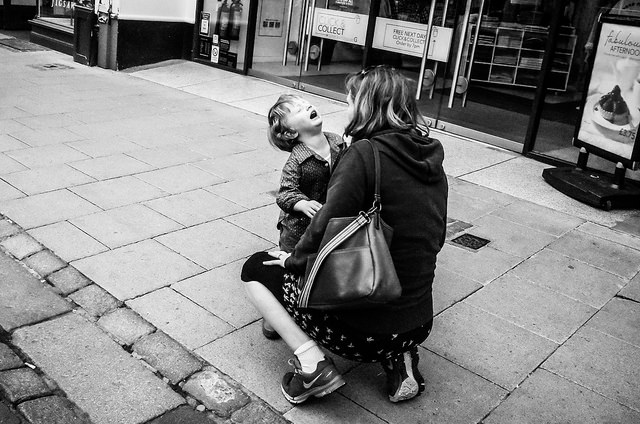One of the greatest challenges of being a single parent is having to share our children.
We, the full-time parents, are the ones who put in the hard work every day. We’re there for the difficult days and the ones filled with joy. We mop up the messes and take care of the sick, and almost all of the sleepless nights are ours to manage. We forge these deep connections with our children, and watch them grow and change. We’re their biggest supporters but also the disciplinarians, teaching them what is right and what is not.
So how do we open ourselves up to allowing new people in their lives, while also protecting them and making sure that we provide the stability and consistency they need?
I’ve had to spend a lot of time thinking about this recently, as my ex-husband has recently introduced someone new into our children’s lives. As a former therapist who worked primarily with childhood trauma, I don’t really trust people I don’t know with my children. I want to protect them, and I hate the idea of them being around people that I neither know nor trust.
But I’ve been talking to several adult children of divorced parents to find out what their experiences were like and what I can do to make these difficult situations easier on my children. I don’t want to be the one who makes this more difficult for them. As much as I want to protect them and keep them to myself, I know that it’s also important that they have a strong support system—one that goes beyond me. The feedback I’ve been getting from children of divorce is to have as amicable a relationship with the other parent as possible (at least in front of the children), to avoid speaking negatively about the other parent if children can hear and to be as supportive as possible of the other people who will come into their lives.
So I’m sitting here trying to wrap my head around a future where these issues have to be managed. I didn’t grow up with divorce, and I never imagined that my children would. Despite the many negative comments I hear about how people throw away their marriages, I worked hard to save mine before deciding that the best decision would be to start a new life with my children. It’s important to me that the life I create for them is one of joy, and this means I must manage my anger at having married someone who let me down. It means I must manage all the conflicted feelings about having people I don’t know or trust in their lives. It means I must keep the focus on what is best for them, even when it’s difficult for me.
So I am challenged to open up my heart and mind to a different future. It is seriously a thankless task. There’s so much resistance in me at the idea of letting anyone else into their lives who I haven’t personally vetted. But I’m also going to have to trust just a little, and make sure that the attitude my children see is a supportive one. I don’t want my children to feel a tug-of-war between the adults in their lives. I want them to have the best relationship possible with all the people who populate their lives.
So how do we do this? What do we need to remember, and what steps should we take?
- We can monitor our thoughts and feelings. We can lean into our resistance and truly feel it. We need to make sure that the decisions we make are based on what is best for our children and not purely on what we think or feel about a situation. We should never put them in a dangerous situation, but sometimes our deep discomfort with sharing our children comes from feelings that have little to do with their safety. We need to make a commitment to being the parent who makes things just a little easier on our kids—even when it’s not easy on us.
- We need to go beyond acceptance and learn to be the enthusiastic supporter. This is a tough one. There is certainly resistance in this, but we have to figure out a way to actually support these relationships and not just begrudgingly accept their existence. So we’ll buy holiday gifts for people we don’t personally have a relationship with and make sure that we’re facilitating those relationships with our children in order to set the best example and help our children have a strong support system.
- We’ll save all of our strong thoughts and feelings (read: profanity-laced venting) for our friends—outside of the earshot of our children. We will not allow our issues to become their issues. We will remember that “little pitchers have big ears” and not disparage the other parent or their partners in the presence of our children. Whatever venting needs to be done should be done in a way that the children are not aware of.
- We can remember that having more people actively involved in our children’s lives means that they have more people to love—and more people to love them. We’re helping them build a strong support system, and this is hard because we’ve always been that support system. We’ve been everything, and it’s hard to allow others in to be a part of that network. But we’ll do it because it’s what is best for our children. We’ll make sure that they know that they are supported and loved by a great many people in their lives.
Mindful parenting is a challenge even when we’re coupled, but single parenting has so many complications it boggles the mind! But if we’re to raise happy, healthy, well-adjusted children, we’re tasked to rise above our own feelings to do what’s best for our children. We need to lean in to our resistance and make sure that our own desires aren’t interfering with what serves the family as a whole.
They say it takes a village to raise a child, and we as single parents have been the whole village for some time now. But maybe—if we open our hearts—we don’t have to be.
Author: Crystal Jackson
Image: Lubomir Simek/Flickr
Editor: Emily Bartran







Read 9 comments and reply